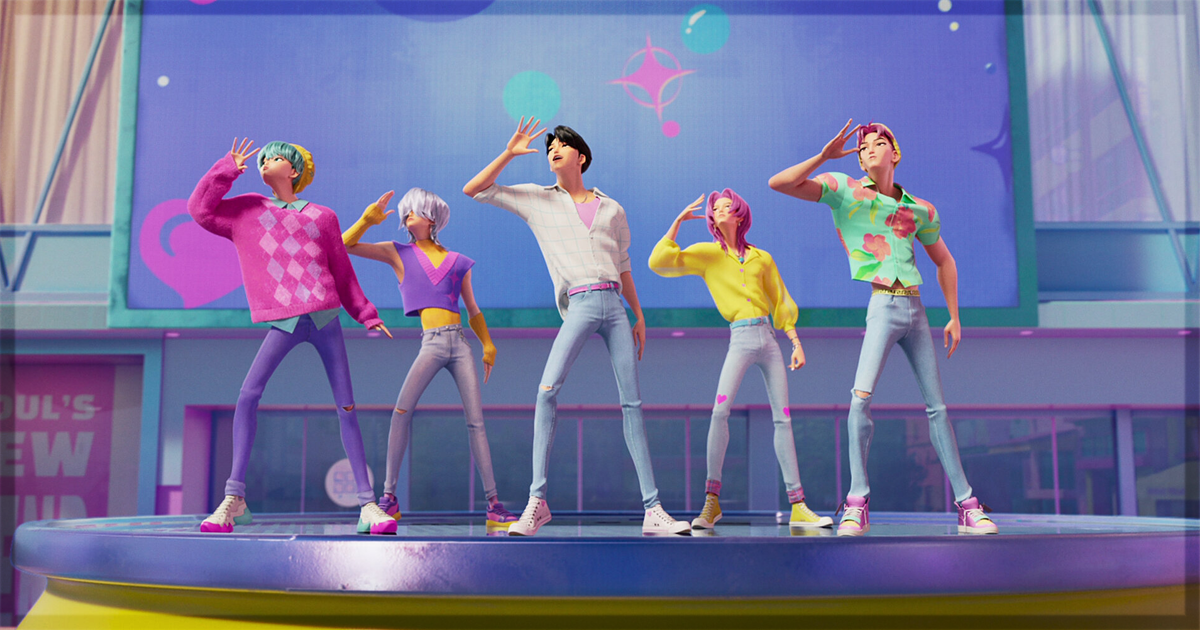KPop Demon Hunters, the latest musical adventure from Sony Pictures Animation, is, in many respects, a global hit. Released in mid-June, the title is officially the most-watched animated movie of all time on Netflix, its distributor. Currently, the film sits comfortably at No. 2 on the streaming service’s Global Top 10 Movies, just behind Happy Gilmore 2, the sequel to Adam Sandler’s 1996 American sports comedy flick, released just a week ago. That is no easy feat considering the streamer’s steady torrent of content. “Golden”—an original ballad single written by EJAE, Mark Sonnenblick, IDO, 24, and TEDDY and subsequently performed by EJAE, Audrey Nuna, and REI AMI as Huntr/x (the female trio in the film)—also claims the No. 2 spot on the Billboard global charts, right behind Alex Warren’s “Ordinary.” KPop Demon Hunters is a kind of movie you watch on repeat, a crowdpleaser propelled by its sonically propulsive anthems, hyperactive visuals, and broadly appealing sentiment.
Directed by Maggie Kang and Chris Appelhans, who both share writing credits alongside Danya Jimenez and Hannah McMechan, the action musical tells the story of a K-pop girl group named Huntr/x, which consists of Rumi (Arden Cho), Mira (May Hong), and Zoey (Ji-young Yoo), tasked to seal the so-called Golden Honmoon, a mystical barrier that keeps evil lord Gwi-Ma (Lee Byung-hun), who harnesses his strength and power by feeding on human souls, and his demons in the underworld. A voiceover instantly thrusts the viewer into the movie’s silly lore, explaining that, for generations, different trios of female singers “born with voices that could drive back the darkness” have been moonlighting as Demon Hunters. Huntr/x continues that duty, rocking their concerts and sending their hordes of fans screaming and jumping to every performance under vibrant, blinding lights.
Like typical K-pop girl groups, Huntr/x members assume designated roles. Mira is the visual and lead dancer. Zoey, who grew up in America, is the rapper and lyricist. Rumi, meanwhile, is the group’s leader and lead vocalist, a talented nepo baby who succeeds her mother, a former member of Sunlight Sister, another girl group hunter. Rumi’s mom died when she was still an infant, so Celine (Yunjin Kim), also an ex-Demon Hunter, fostered her. But beyond being a maternal figure to Rumi, Celine also keeps the bona fide pop star royalty’s lifelong secret: Rumi is part-demon, unbeknownst to her bandmates, who have also become her closest friends. She conceals her demonic “patterns” under her glittery long-sleeved garments. But Rumi’s secret will soon be discovered by Jinu (Ahn Hyo-seop), a demon with a beautiful voice who suggests to Gwi-Ma that the only way to defeat the evil-hunting female pop stars is to form a demon boy band later named Saja Boys, who go after the fans and quickly become a global sensation after a flash mob performance, featuring the captivating, bubblegum track “Soda Pop,” voiced by Andrew Choi, Neckwav, Danny Chung, Kevin Woo, and Samuil Lee (the movie provides a different set of performers for the musical numbers). The introduction of the demonic K-pop band to some extent feels like the movie’s response to the celebrity illuminati conspiracy theory popular in the 2010s.
While tensions between the hunters and the demons rise—which prompts Huntr/x to write the punching diss track “Takedown,” written with swagger attitude by Lindgren, as a way to intimidate the evil forces—Rumi and Jinu form a push-and-pull relationship anchored on their internal dilemmas (Jinu himself tries to outrun a dark past), which heightens the film’s articulations about shame, self-doubt, and the bifurcation of identities in show business—how pop stars are manufactured, especially in the Korean idol industry, and forced to project a kind of bloated performer persona, which superfans often mistake for personality.
It helps that KPop Demon Hunters does not function as an origin story. The rapport between the central trio is already established, which allows the narrative to explore who these women really are behind the camera, the big arenas, and the well-staged performances. It is also in these moments that the movie largely injects humor, like in the opening fight scene, where the trio turn into goofballs (aided by manga-fueled animation) as they aggressively devour their favorite instant noodles, which are also branded after them, before their plane crashes and kills the demons who hijack their ride; or in another hilarious moment, when the girls first run across the Saja Boys, whose sex appeal elicits cartoonish reactions from Mira and Zoey, complete with eyes turning into exaggerated red hearts and overflowing pop corns. Similarly, the picture probes into pop culture consumption at large, from parasocial fan behaviors, like mirroring the image of an idol, to endless obsessions in loveteams and celebrity rivalries.
In terms of plotting, the film is chiefly upbeat, speeding up the narrative throughout its 85-minute runtime (minus the closing credits). It is matched by a visual and sonic grammar that not only reflects the bouncy energy but also the actual feel of real-life K-pop bangers, say a BTS track or a TWICE music video, which is no surprise given that Kang and Appelhans gathered seasoned music producers the likes of Teddy Park, Lindgren, Stephen Kirk, and Jenna Andrews (who all have experience working with K-pop acts), among others, as collaborators, with Ian Eisendrath serving as the executive music producer. The music for “Golden,” for instance, parallels the expensive productions that top K-pop groups usually boast, especially during a big comeback. “Soda Pop,” meanwhile, is the kind of track that will likely launch a viral TikTok dance trend, which it has already done.
However, the pace somehow kneecaps the narrative’s depth. Of the female trio, Rumi is the most substantial. The viewer cannot help but feel how Mira and Zoey and their character attributes largely play foil to Rumi. Even Rumi’s connection with Jinu, though highlighted in a lovely duet, still doesn’t register strong enough to warrant the emotional wallop that the film’s climax, the face-off between Rumi and the demon lord, demands. Nevertheless, it is hard to look past the personal resonance that the movie engenders, most crucially among its K-pop audience. It might be formulaic, but it is also strikingly fresh, at least in the context of recent animated endeavors. Above anything, its real superpower lies in its music.
Kpop Demon Hunters is now streaming on Netflix.
Learn more about the film at the official website for the title.


